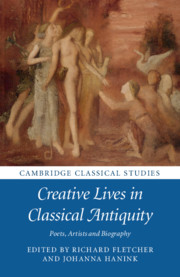Book contents
- Frontmatter
- Contents
- List of contributors
- List of illustrations
- Part I Opening remarks
- Part II Reviving dead poets
- Part III Lives in unexpected places
- Part IV Laughing matters and Lives of the mind
- Part V Portraits of the artist
- 11 ‘It is Orpheus when there is singing’: the mythical fabric of musical lives
- 12 The artist as anecdote: creating creators in ancient texts and modern art history
- 13 Freud and the biography of antiquity
- Envoi
- Works cited
- Index
13 - Freud and the biography of antiquity
from Part V - Portraits of the artist
Published online by Cambridge University Press: 01 December 2016
- Frontmatter
- Contents
- List of contributors
- List of illustrations
- Part I Opening remarks
- Part II Reviving dead poets
- Part III Lives in unexpected places
- Part IV Laughing matters and Lives of the mind
- Part V Portraits of the artist
- 11 ‘It is Orpheus when there is singing’: the mythical fabric of musical lives
- 12 The artist as anecdote: creating creators in ancient texts and modern art history
- 13 Freud and the biography of antiquity
- Envoi
- Works cited
- Index
Summary
‘There is’, Sigmund Freud tells us in his psychobiography of the great artist, ‘only one place in his scientific notebooks where Leonardo [da Vinci] inserts a piece of information about his childhood’. In the course of a discussion of the mechanics of the flight of vultures, Leonardo interjects this anecdote:
It seems that I was always destined to be so deeply concerned with vultures; for I recall as one of my very earliest memories that while I was in my cradle a vulture came down to me, and opened my mouth with its tail, and struck me many times with its tail against my lips.
This single and fleeting vista onto the childhood of Leonardo acts for Freud as a key to unlocking what Ernst Kris and Otto Kurz will call ‘the riddle of the artist’. As Freud writes at the start of his biographical sketch: ‘Leonardo da Vinci (1452–1519) was admired even by his contemporaries as one of the greatest men of the Italian renaissance; yet in their time he had already begun to seem an enigma, just as he does to us to-day’. It is hardly surprising that Freud, whose biography of the artist is billed from its opening phrase as a piece of ‘psychiatric research’, should be concerned with Leonardo's childhood. But in this case it is not merely Freud but Leonardo himself who sees this childhood memory as key to understanding the obsessions of the mature artist: ‘it seems I was always destined to be so deeply concerned …’. The anecdote related to Leonardo's creative awakening does not arise from a retrospective account of his life written by one of his admirers but instead forms part of his own autobiographical musings.
Childhood, as Kris and Kurz observe, forms a privileged site in the construction of the artist's biography. In analysing a succession of ancient and early modern stories recounted in the biographical traditions of artists, Kris and Kurz discern a universal pattern which ultimately gives rise to the ‘heroization of the artist’. In a pattern which Leonardo evidently follows, an event from early childhood is seen to hold the key to understanding later greatness.
- Type
- Chapter
- Information
- Creative Lives in Classical AntiquityPoets, Artists and Biography, pp. 305 - 326Publisher: Cambridge University PressPrint publication year: 2016
- 1
- Cited by



